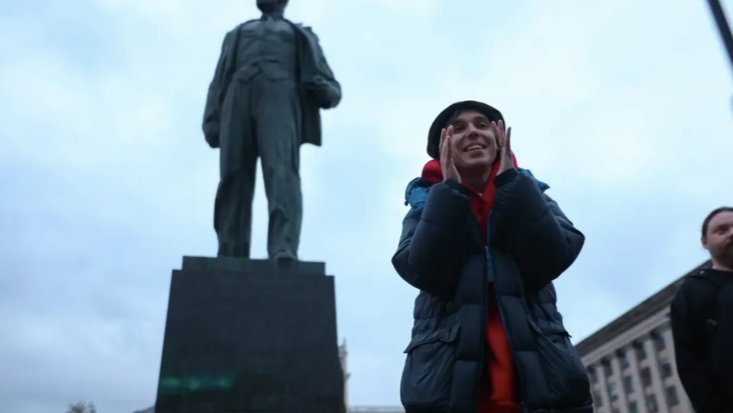On Monday, 26 September, a police strike team barged into the apartment shared by poet Artem Kamardin and activists Alexander Menyukov and Alexandra Popova. The reason for the “room inspection”, which is supposed to be voluntary in accordance with the Russian law, was Kamardin’s performance at the anti-mobilisation Mayakovsky poetry readings in Moscow with a poem dubbed “Kill me, militiaman”.
The poet says that during the search, he was tortured and raped with a dumbbell bar. The policemen shot a video of the rape and then showed it to his girlfriend Alexandra Popova. The police also tortured her in another room: they superglued stickers on her face and eyes, beat her and told her that the five of them would rape her. Later, Kamardin was charged with inciting hatred or enmity towards “the members of volunteer armed formations of the Donetsk and Luhansk People’s Republics”.
Novaya Gazeta. Europe has reconstructed the events of that day to find out what the poets and activists went through.
The Mayakovsky readings are usually held every last Sunday of the month in Moscow, near the monument to famous Russian poet Vladimir Mayakovsky. The readings are attended by young poets who recite their own poems, often dedicated to current political events. “There are dozens of poetry platforms in Russia, but only one poetry square. Unlike many other literary events, the Mayakovsky readings have always been known for complete freedom of expression, spirit, meanings, words, poetry practices. This is why people came there. Anyone could perform on the square, without any restrictions, guidelines, or conjuncture: everyone was always equal. Anyone could recite poetry there: workers, seniors, businessmen, students. You could hear traditional iambic pentameters there along with bold vers libre of young punks and avant-garde lines of academic poets. Sometimes it seemed that there wasn’t a lot that united the people gathered there except an interest in the real, alive, and contemporary word,” journalist Konstantin Vorovich with Discourse magazine says. Last year, the magazine published several compilations of the best poems recited at the Mayakovsky readings.
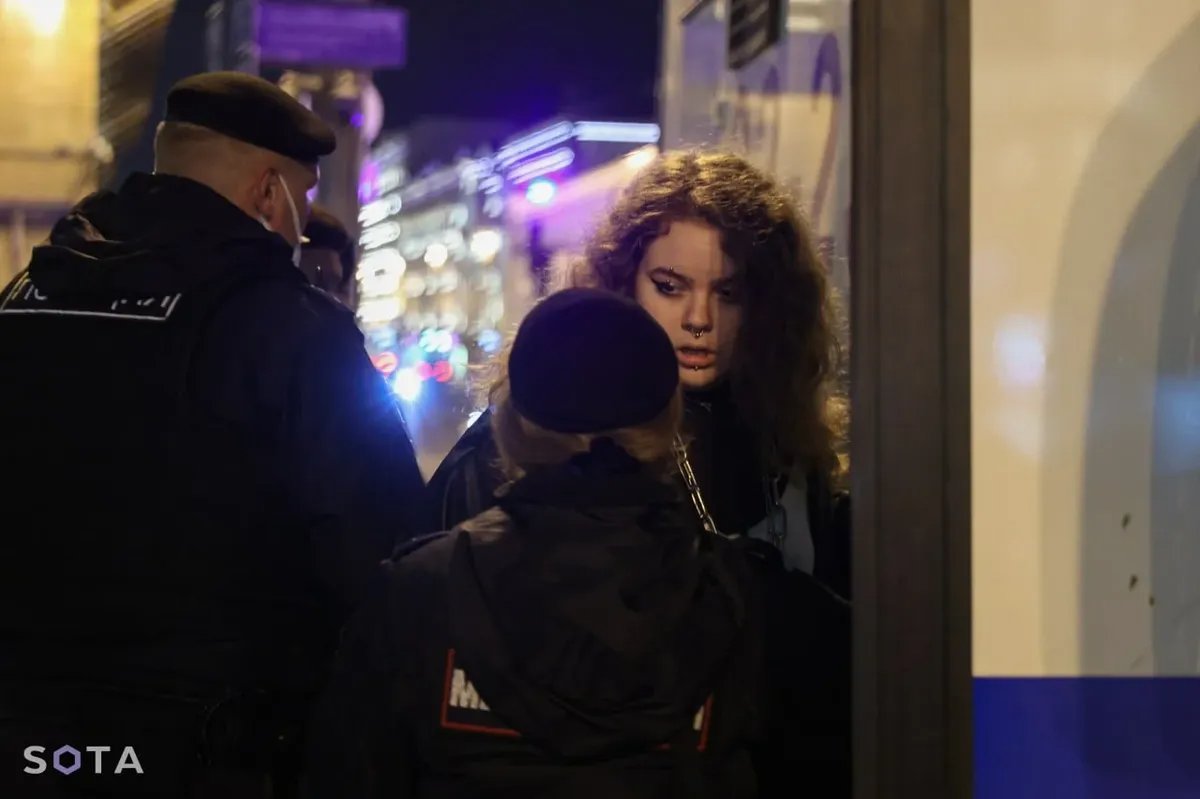
Photo: Telegram
The Mayakovsky readings are rarely attended by more than a couple dozen people. Artem Kamardin was a permanent performer at the readings. He recited his poetry there and also attended rallies in support of political prisoners: for example, he picketed in support of the defendants who were tortured with electric shocks in the so-called Network case. He and his fellow poets decided to dedicate the latest session of the readings to the “partial mobilisation” declared by Vladimir Putin. Police officers disrupted the readings thirty minutes after they had begun and immediately started to detain its participants.
Nikolay Dayneko and an underage girl were the first to be detained. They were later found at a police station on the outskirts of Moscow. The police planned to file charges against them for taking part in an unsanctioned public event. In the evening of the same day, the police detained three more participants of the readings in front of their house: Boris Bulgakov, Nazar Arifdzhanov, and his girlfriend Polina Yakunina. The detained could only contact their friends on Monday morning. They said they were being accused of disobeying police officers. Later, a Moscow court sentenced the two men to a 10-day jail term, while the woman was sentenced to seven days in jail on administrative charges.
However, it was Artem Kamardin’s performance that got the most attention. On Sunday evening, a number of pro-government Telegram channels, as well as Vladimir Pozdnyakov, the leader of the Male State extremist organisation, started spreading the video of Kamardin reciting his poem. “Glory to Kievan Rus, Novorossiya — suck dick!” the poet reads with emotion. (Novorossiya, or New Russia, is how the Russian propaganda refers to Ukraine’s southern and eastern regions — translator’s note)
He was not detained on that evening, however, Alexandra Popova, an activist and Kamardin’s girlfriend, says that they noticed a surveillance team camped out in front of their apartment building. “We noticed the surveillance even before the search: there was a car parked in front of our building all night. We couldn’t get out. And then the cops came,” Popova recalls.
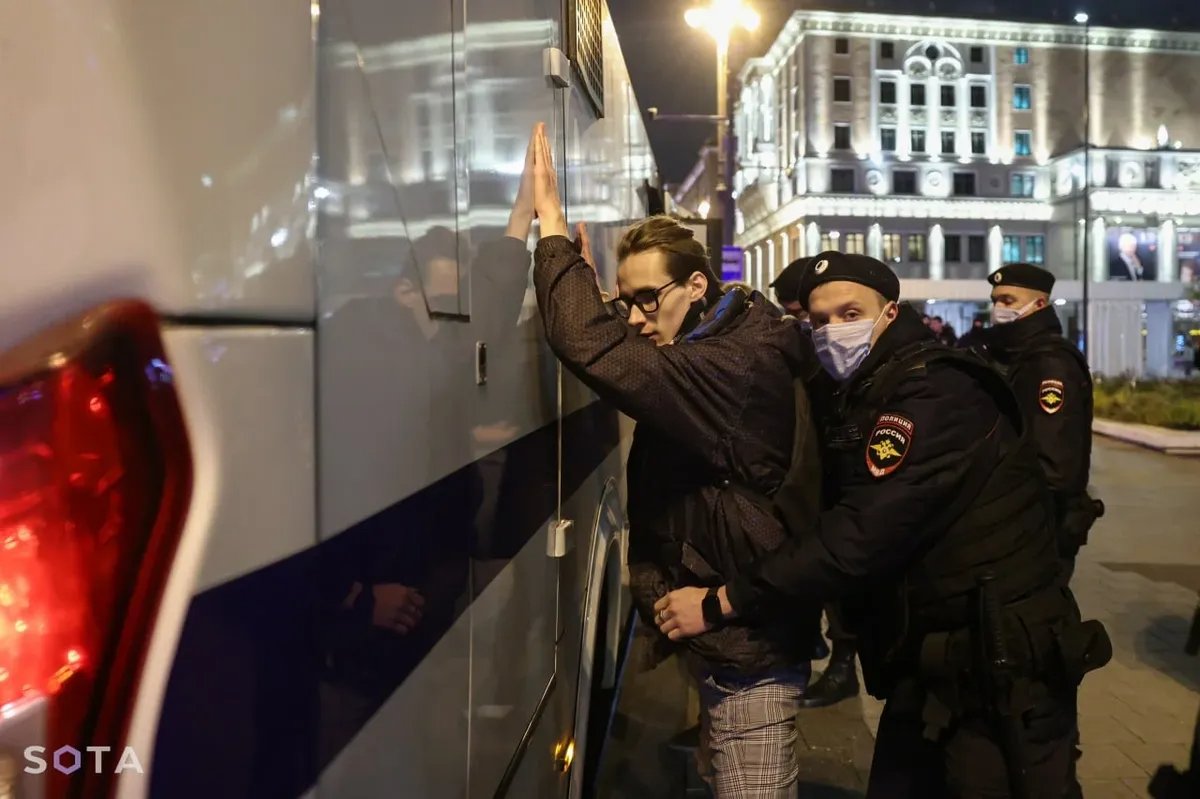
Photo: Telegram
‘I was lying face down on the floor and heard them beating Artem’
Alexandra says that at first, the police broke down the door to their neighbours’ flat. Then they realised their mistake and started breaking down the activists’ door, ignoring their requests to wait for their attorney, who was already on his way. “I quickly realised that it would be safer to just lie down on the floor myself with my hands behind my head, which is what I did,” Alexander Menyukov recalls. After they broke down the door, the policemen barged into the flat and put everyone down on the floor in different rooms of the flat. “They dragged me out of the hallway so that I wouldn’t get in the way. I was lying face down on the floor [in the room] and heard them beating up Artem. Other officers kept passing me by and kicking me, stepping on my hand, pulling my hair so that I would move,” Popova says.
When they saw Alexandra reacting to Kamardin’s screams, the policemen asked her whether she was in a relationship with him. “I said that I’m his girlfriend now and I’ll be his wife in the future,” she continues. “After that, they pulled me up by my hair and started yelling that I’m Nazi scum. Then they brought stickers and superglue and started supergluing them on my face, they tried to glue my mouth shut, they dragged me by my hair. While I was there with stickers on my face, I heard them beating Artem. Sound carries in this flat. Then I heard them say ‘Take off your clothes, get naked, scum’ and punch him again. And so, they started undressing him. And then it seems that they found something that they could stick in his anus and started doing that. They did it, and then they started showing me photos and videos of that and of them beating him up.”
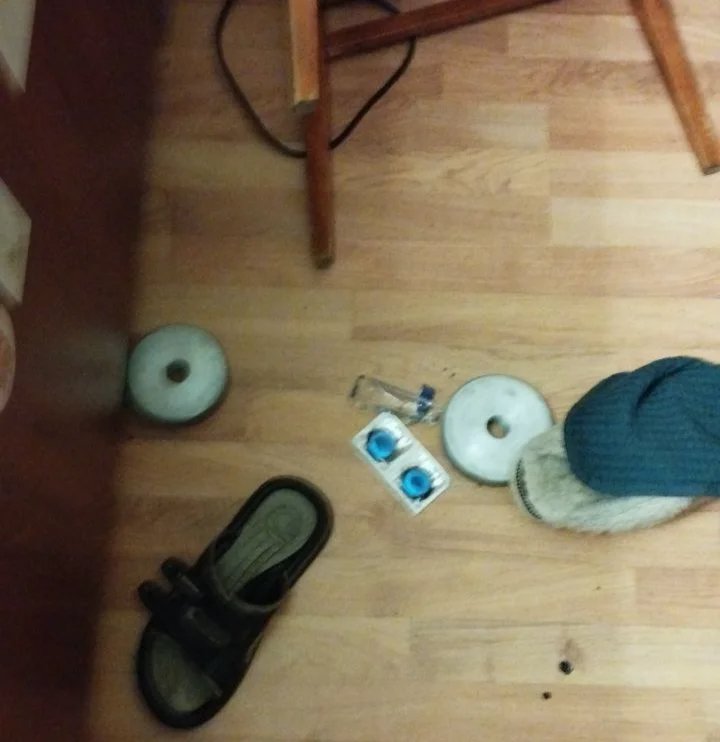
The weight plates of the dumbbell that was supposedly used to torture Artem Kamardin. Photo provided by Alexandra Popova
According to Popova and Kamardin’s attorney Leonid Solovyev, the policemen inserted a dumbbell bar into Kamardin’s anus. Later that night, when Artem’s friends finally managed to enter the flat, they did not find the bar, only the weight plates that were attached to it. The activist thinks that the officers took the dumbbell bar with them to cover up the evidence of the crime.
At the same time, other policemen were beating up political activist Alexander Menyukov in a separate room. Despite the fact that he had lain down on the floor with his hands behind his head before they came in to avoid physical violence, the officers mistook him for Kamardin and started beating him up. “They mainly hit me in the back. My ear is a bit smashed, there are bruises and hematomas on my back and on my wrists. After they beat me for a while, they pressed a foot into my back. I don’t know how long I spent like this. Then they took me to the hallway, and the operative said: ‘That’s not him.’ Then they punched me a couple more times,” he told Meduza.
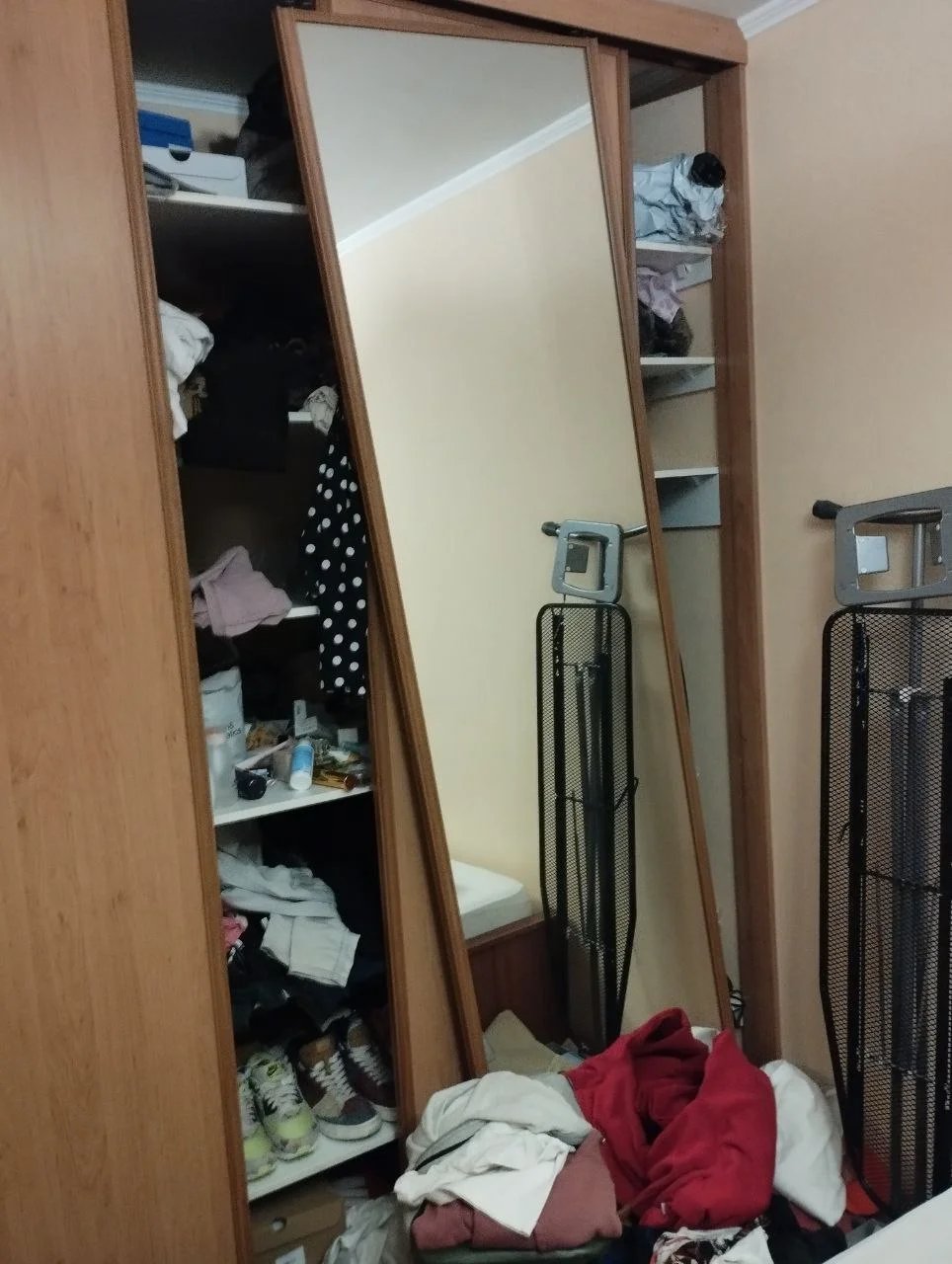
The aftermath of the search. Photo provided by Alexandra Popova
Meanwhile, the policemen were ransacking all rooms in the flat except for the kitchen. Alexandra Popova says that they found a box of condoms and scattered them around the flat. The officers also went through their personal things, pushed stuff off the shelves, and broke an Xbox console. They made Kamardin put on several condoms on the dumbbell bar to avoid physical injuries, attorney Leonid Solovyev relays the words of his client. According to Popova, the search was carried out without any witnesses at first, which is against the law, but they were later told to come in by the investigator. Before the witnesses entered the flat, the officers got rid of all the evidence of torture: they washed Kamardin’s face, washed the blood off the floor and the furniture, and put away the dumbbell bar.
Waiting for the unknown
After the search was over, the policemen put a winter hat on Kamardin’s head, pulling it over his eyes “to hide the evidence of the beating”, Popova recalls. He was then cuffed and escorted to the car. This was shot for Petrovka 38, a TV show that covers police raids. Menyukov and Popova were escorted out of the flat uncuffed. All of them were brought to a police station in central Moscow. According to Popova, they brought Artem to a police van and made him put his head between his knees. They also forbid him from talking or raising his head, lest they beat him up again. He spent over an hour and a half like that waiting to be escorted to the police station.
After Kamardin’s arrest, a Telegram channel with ties to Russian TV channel REN-TV published a video showing three people on their knees saying sorry for the poem dubbed “Kill me, militiaman”. The video shows signs of beatings on Kamardin’s face. His girlfriend says that the policemen tortured and raped the poet in order to make him record this video. “They yelled that he was a Nazi, and I’m the girlfriend of a Nazi. They pulled my hair and asked me if I support Nazis. I told them no,” Alexandra Popova says.
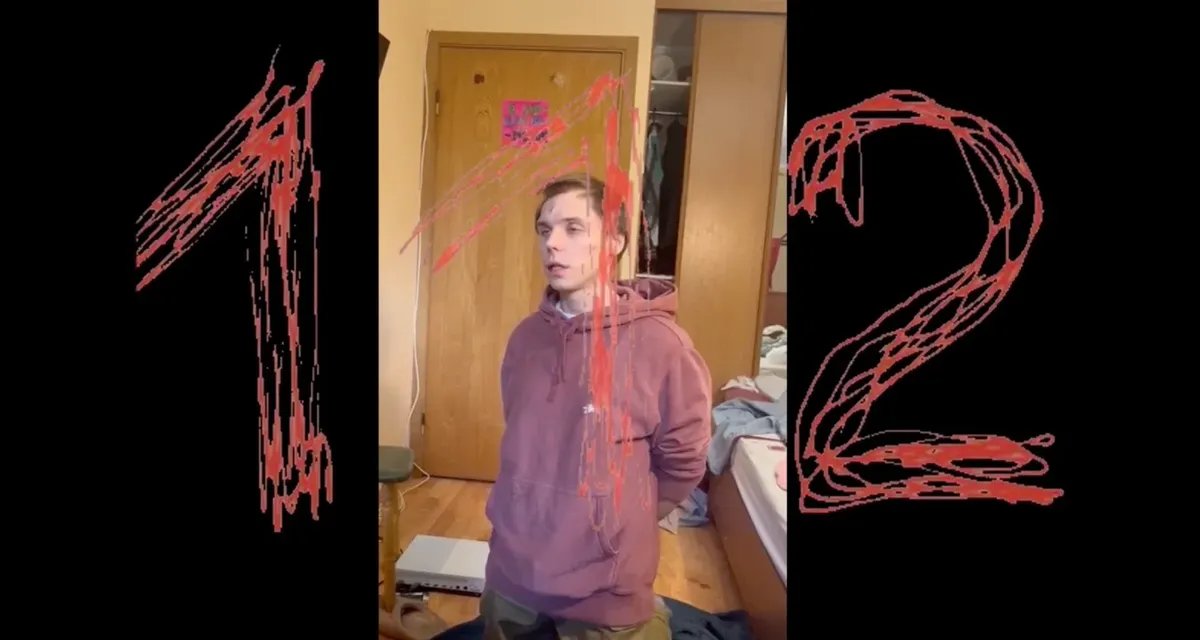
Artem Kamardin. Photo: a screenshot from the video
At first, only three people — Menyukov, Popova and Kamardin — were taken to the police station, but later, they brought in an underage girl and two more participants of the Mayakovsky readings that were detained earlier, Nikolay Dayneko and Egor Shtovba. Popova and Menyukov gave witness statements, but they were not told what case they are witnesses in. Attorney Leonid Solovyev says that they were told what his client is accused of late at night. Several hours after Dayneko and Shtovba were brought to the police station, they were named suspects in the case of inciting hatred or enmity.
According to the police report shown to Novaya Gazeta. Europe by attorneys Leonid Solovyev and Leysan Mannapova, Kamardin, Shtovba and Dayneko are suspected of “inciting hatred, enmity or degrading members of the volunteer formations of the Donetsk and Luhansk People’s Republics”, as well as calling for “using violence in relation to the aforementioned group of people and members of their families”. The investigators did not specify which part of the poetry readings violated the law.
Kamardin’s girlfriend Alexandra Popova was the first to be released from the police station. Later during the night, an ambulance team was called in to document the injuries he received during the search. The paramedics diagnosed Kamardin with a concussion, a closed head injury, thoracic bruising and multiple abrasions on his face, a medical report in possession of Novaya Gazeta. Europe reads. According to his attorney, the medics said that Kamardin should be hospitalised. Some time later, the ambulance took him to Hospital №67 in Moscow. After that, Alexander Menyukov was released from the station. He and Popova went to have a medical examination.
The doctors of Hospital №67 confirmed that Kamardin had “numerous bruises and abrasions”, however, the urologist did not check for injuries to the colon and only performed a visual examination, Kamardin’s attorney said, relaying his client’s words. Doctors of the clinic that Popova and Menyukov went to also documented soft tissue bruises on various parts of their bodies. They diagnosed Popova with a concussion and abrasions on her left wrist. As it turned out later, the hospital refused to hospitalise Kamardin, and he was sent to a detention centre along with Shtovba and Dayneko.
Arrest follows torture
On Wednesday, 28 September, the investigator petitioned a court in Moscow to send the three suspects to a pre-trial detention centre. They were still not officially charged with anything. The case materials seen by Novaya Gazeta. Europe include a “research report”, in which an expert whose specialisation is not known analyses the poem “Kill me, militiaman” that Kamardin recited at the latest Mayakovsky readings. According to the expert, the phrases “kill me, militiaman” and “pull me to shreds” include calls for violence, even though they are aimed at Kamardin himself.
The court hearing was initially set to take place at 3 PM, however, it started much later, at about 5 PM, an hour before the court closed. Despite the objections of the defence, the court ruled to send Nikolay Dayneko to a pre-trial detention facility. A medical report confirming he has a mental health condition and a proposal of the defence to put him under house arrest at a flat in Moscow did not affect the ruling. The court also ignored the fact that Dayneko had not recited the poem that “incited hatred” according to the investigation.

Nikolay Dayneko. Photo: Ekaterina Yeshchenko
After the first court ruling, the bailiff started escorting dozens of spectators out of the court building despite the fact that there were still no rulings regarding the other two suspects. This was done by order of the court chairman. Kamardin’s girlfriend Alexandra Popova was among those escorted out. She was unable to see her boyfriend. Meanwhile, Dayneko’s relatives were sobbing in the hallway after hearing the news of his arrest.
Three hours later, the same court arrested another suspect in the case Yegor Shtovba until 25 November. His friends say that it was the first time he participated in the Mayakovsky readings, and it ended in a criminal case. Still, both he and Nikolay Dayneko were forced to say sorry on video for the poem “Kill me, militiaman”. It is unknown whether they were tortured like Kamardin in the run-up to the recordings.
Artem Kamardin’s ruling was the last one that night, at about 9 PM. There were no spectators in the courtroom at the time of the ruling, they were all escorted outside. “He’s strong. He will get through it,” Alexandra Popova said tearfully when she heard of the ruling in front of the court building. The poet will stay at the pre-trial detention facility until at least 25 November.
Join us in rebuilding Novaya Gazeta Europe
The Russian government has banned independent media. We were forced to leave our country in order to keep doing our job, telling our readers about what is going on Russia, Ukraine and Europe.
We will continue fighting against warfare and dictatorship. We believe that freedom of speech is the most efficient antidote against tyranny. Support us financially to help us fight for peace and freedom.
By clicking the Support button, you agree to the processing of your personal data.
To cancel a regular donation, please write to [email protected]
